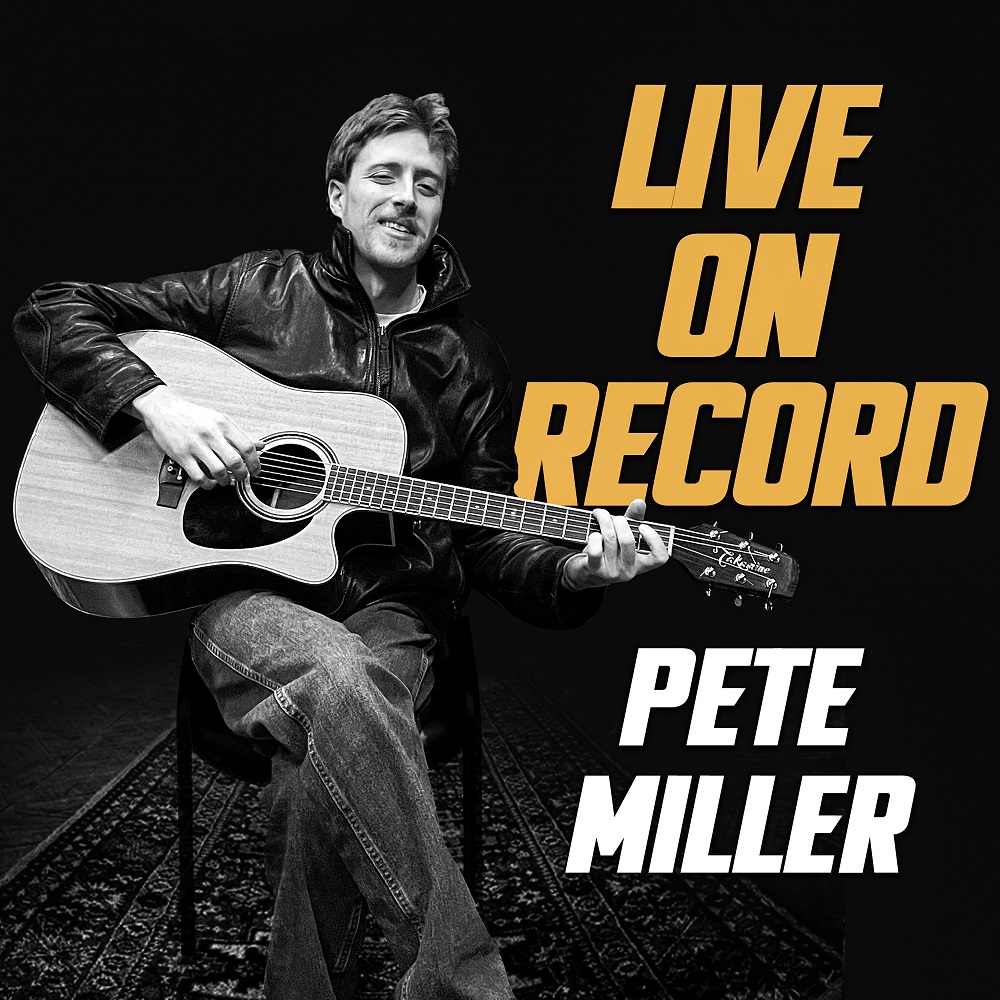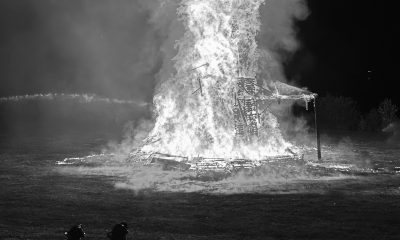Album Review
Album Review: Pete Miller’s “Live on Record”

When it comes to genuine and unembellished music, Pete Miller’s debut album “Live on Record” is a revitalizing breeze in the current music landscape. Released on MTS Records, the LP presents an artist who, despite the modernity around him, channels a vintage, heartfelt essence that’s increasingly rare. Combining elements of folk, country, and rock, Miller’s work is a throwback to an era where music was raw and storytelling was genuine.
A Connecticut native who now calls Pennsylvania home, Pete Miller’s journey to his debut album wasn’t one paved with glitter and glamor. Escaping the allure of New York City, Miller worked various blue-collar jobs, including landscaping, warehouse labor, and construction while chasing his musical dreams. His life’s experiences, genuinely reflected in his songs, make “Live on Record” an autobiographical piece that resonates with the “everyman.”
From the get-go, Miller’s voice draws comparisons to the legendary Johnny Cash, a resemblance he carries with pride. His rich baritone and poetic lyricism are reminiscent of the Man in Black’s storytelling prowess. Influences of Townes Van Zandt’s melancholic narratives also weave through the album, grounding Miller firmly in the tradition of great American singer-songwriters.
The album’s opener, “A Light Out There – Intro Version,” sets the tone with a soulful introduction that hooks listeners. The lyrics, “You may go away, but the story will survive. You want to return, but wonder if you’ll arrive…” instantly pull you into Miller’s world – reflective, tinged with melancholy, yet hopeful. The full version of “A Light Out There” has garnered significant attention, amassing over 119K streams on Spotify and breaking into the UK iTunes Top 20 Singer-Songwriters Chart. The full album is quickly approaching 1 million Spotify streams!
Each song on the album is meticulously crafted to tell a story, from the contemplative “The Star Showman, Pt. I” to the earnest “Oh, Lord,” each track offers a glimpse into Miller’s life and experiences. In “The Dazzling Kimberly,” Miller’s narrative style shines through, painting vivid images of characters and emotions with minimalistic yet powerful instrumentation.
The simplicity of the album is its greatest strength. Miller’s acoustic guitar work is untainted by overproduction, allowing the natural sound of the instrument to take center stage. His playing is rhythmic and engaging, supporting his vocals without overshadowing the poignant lyrics. Tracks like “I Wrote Hannah a Letter” and “Hard to Find” showcase this beautifully, with Miller’s jangling guitar providing the perfect backdrop for his homespun poetry.
“Midnight Blue” and “The Raven & the Dove” delve deeper into Miller’s introspective side, offering meditative and almost haunting melodies that linger long after the song ends. They’re a testament to Miller’s ability to evoke strong emotions through his music, making listeners feel the weight of his words and the authenticity of his experiences.
The album’s closer, the complete version of “A Light Out There,” is a fitting end to the journey. It encapsulates the overarching themes of the album – longing, resilience, and a quest for meaning. The lyrics, “When you suffer, you’re out of this land. When you came back through that door, the waves didn’t remember your feet on the shore,” resonate with anyone who’s felt lost and found solace in the simplicity of life.
“Live on Record” is an album that doesn’t aspire to be flashy or trendy. Instead, it focuses on being real and relatable. Pete Miller’s music is a reflection of his life – unpolished yet profound, simple yet deeply meaningful. His storytelling is the heart of the album, and it’s this authenticity that makes his debut a standout.
As Miller works on his follow-up album in the woods of Pennsylvania, one can only anticipate the continuation of his musical journey. If “Live on Record” is any indication, Pete Miller is poised to carve out a niche for himself in the music industry, staying true to his roots and delivering music that is as raw and real as it gets.
For more information on Pete Miller and to connect with his music, check him out on Facebook.
Album Review
Saint Escape sets the past on fire with latest release “Look At What You Made”

Saint Escape isn’t here to reconcile the past, they’re here to torch it. Now, with the release of their new single “Look At What You Made,” Saint Escape have unleashed a punishing, nu-metal-infused anthem that just sounds like an equal measure of reckoning and release. It is loud, confrontational, and honest, exactly what a purging rock record should be.
Produced and mixed by Joe Rickard, Starset, Three Days Grace, Breaking Benjamin, the track delivers a tight punch that fuses wild aggression and arena-sized power. “Look At What You Made” doesn’t stop. Rickard’s slick production redoubles Saint Escape’s raw edge rather than sanding it down, and the song takes on a huge, modern rock sound without losing its bite.
“Look At What You Made” is a primal response to toxic authority figures, the kind who kept order through fear, misinformation, and control, and knew where best to leave emotional scars. On “Look At What You Made,” the anger boiling beneath the surface becomes something purposeful, an anthem for anyone who’s been moulded by manipulation and left in its wake. The effect is communal shake-off, a determination not to be shaped by the past.
And lead vocalist Matt Cox provides a threatening, buffed clean vocal performance, of sorts as well, one that’s heavy with anger and determination. There is rage here, but also clarity, a sense that this is less about revenge than about reclaiming autonomy. As Cox puts it, the song is a purge, a reminder that the future belongs to those willing to to take it back. “Look At What You Made” is a testament to strength and newfound independence, it’s further evidence that Saint Escape are bleeding their past into something louder, stranger, and harder to ignore.
Album Review
Big O redefines artistic evolution with “When it’s Not Said, But Done” album

Big O’s “When it’s Not Said, But Done” is a whisper of transformation narrated through rhythm, texture, and space. Across its fifteen tracks, spanning just under forty-seven minutes, Big O sacrifices flash for feeling and ego for essence.
The production feels like an artist who has finally quit chasing something external and is instead listening inward. The flow of the album is methodical but organic, with each track leading into the other as if they were diary entries. On “Free Spirit,” Big O creates a soundscape that embodies freedom in action, with rhythms that propel you forward. It’s one of those rare songs that can be at once contemplative and propulsive, with a slow revelation. And also, “New Found Joy” is an anthem for rebirth.
Big O’s production vision here is sweeping and cinematic, but also intimate. The presence of live musicians gives an organic texture. Jeronimo G’s xylophone on track nine tolls like an intimate conversation, while IB Delight’s saxophone on track ten blows satisfying warmth and longing into the mix. These collaborative moments are the crucial parts of Big O’s unfolding language.
Every choice, from the minimal artwork by Andriyan Robby to the in-house mixing and mastering by Big O himself, is consistent with the album’s spirit of transformational thought. In “When it’s Not Said, But Done,” Big O has created a statement on silent courage. It is an album for those who know that, in reality, real change does not need to be shouted from the mountaintops, but only heard, felt, and lived.
-

 Artist Spotlight6 days ago
Artist Spotlight6 days agoGOODTWIN shares reflection with indie-pop single, “Soak It Up”
-

 Artist Spotlight4 days ago
Artist Spotlight4 days agoSAMSARA transforms quiet heartbreak into a modern rock journey on latest release “mrs. porter”
-

 Artist Spotlight4 days ago
Artist Spotlight4 days agoTom Woodward exposes the dark side of modern idol worship in latest release “PHONEY MESSIAH”
-

 Artist Spotlight4 days ago
Artist Spotlight4 days agoMORPHEUS VON DOBENHAUSEN lets go of the chaos, dancing steady soft and slow in latest release “GOODBYE CHAOS”
-

 Artist Spotlight4 days ago
Artist Spotlight4 days agoSkillMusicsa speaks in silence when love fades with latest release “How Could You”
-

 Artist Spotlight4 days ago
Artist Spotlight4 days agoSavvie steps out with an anthem of power and perseverance on latest release “Incredible”
-

 Artist Spotlight2 days ago
Artist Spotlight2 days agoBilly Chuck Da Goat turns walking away into a bold statement in latest release “Road Jack”
-

 Artist Spotlight2 days ago
Artist Spotlight2 days agoMamas Gun and Brian Jackson shines light on the truth on latest release “DIG!”













